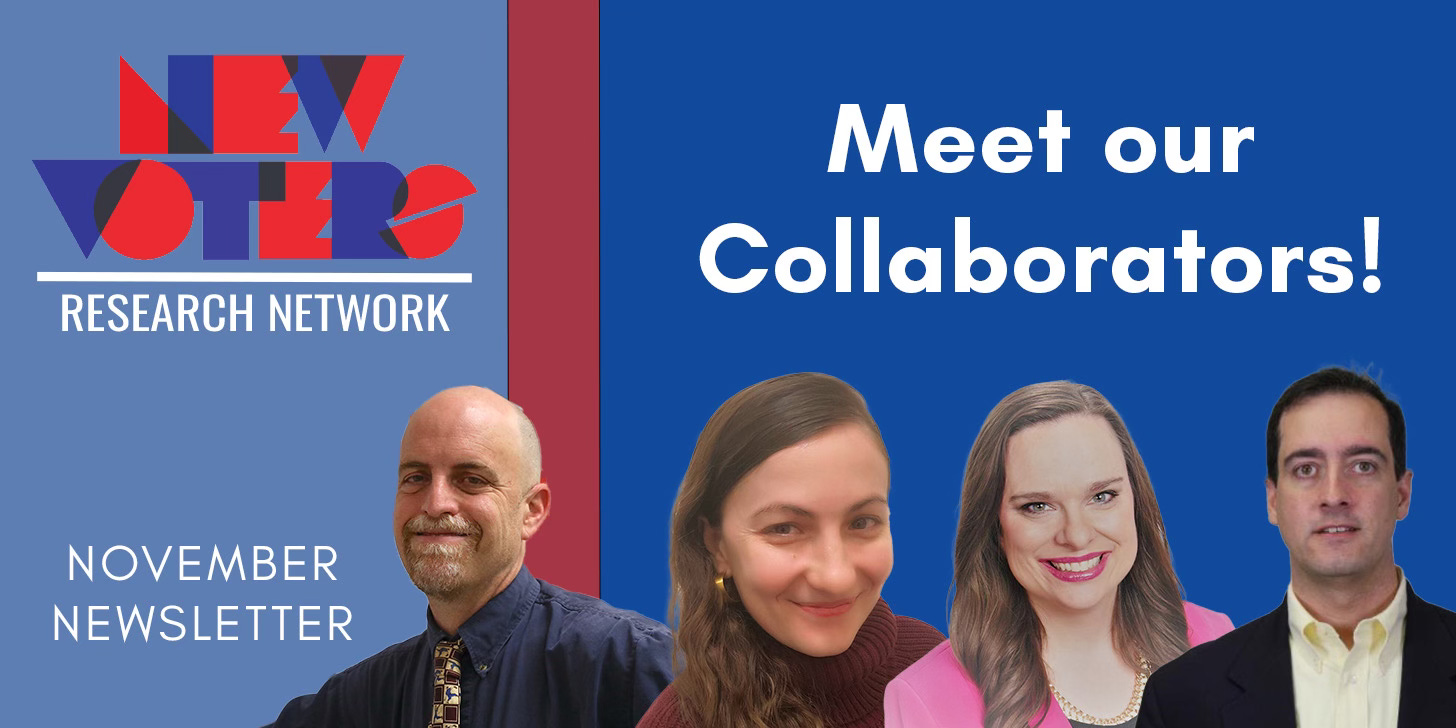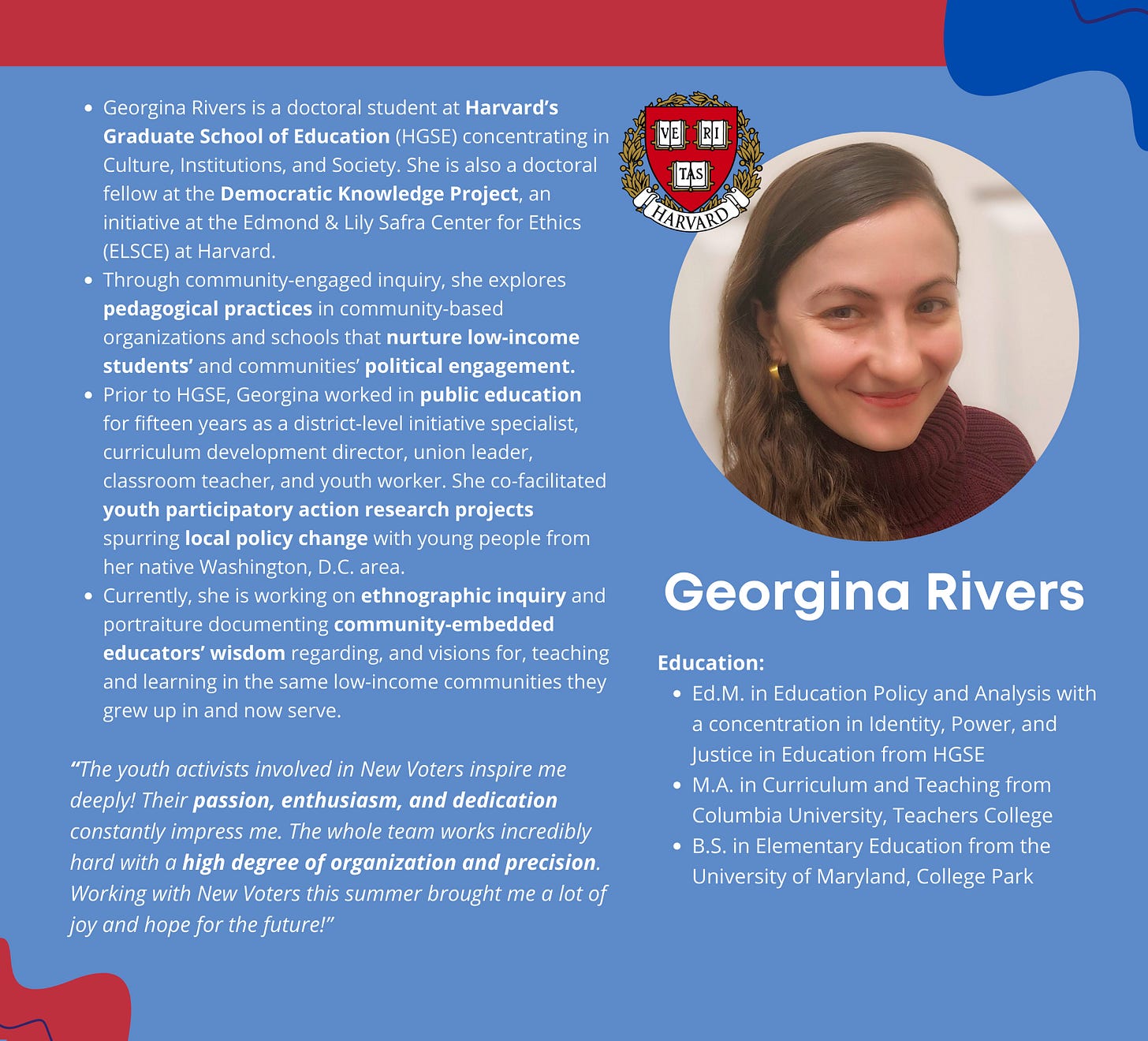Introducing Our Academic Collaborators!
In this newsletter, we introduce you to some of our academic collaborators, share updates on three ongoing projects, and spotlight a recent publication relevant to high school voting.
Welcome back to the New Voters Research Network newsletter! We were inspired by the November 2023 elections, where youth voters turned out and were heard in prominent elections across the country. Our team continues to conduct high school civic engagement and voting research, which is increasingly important as we near the critical 2024 election cycle.
Each newsletter is written by a pair of research assistants at the NVRN. This month, we (Anish + Collin) are excited to share updates on select NVRN projects and introduce the professors and graduate students we are so lucky to work with. Although we have never met in person, we are both from Pennsylvania (Philly and Pittsburgh), work on several projects together and have grown to become close friends. Both of us ran voter registration drives at our respective high schools (Conestoga HS and North Allegheny Senior HS) and continue to lead civic engagement efforts.
In this newsletter, you will find:
An overview of three additional NVRN Projects:
Youth Involvement in Policymaking Study
A Qualitative Analysis of Generation Citizen’s Civic Education Curriculum
NVRN Website & Summer Camp Blog Posts
Introductions to a few of our academic collaborators
A summary of published research relevant to HS students selected by our team
If you want to help us in our mission, please share this newsletter!
In each monthly newsletter, we describe a few of our ongoing research projects. Read below to learn about three projects being conducted by our high school and college student research assistants!
Select Projects
(1) Youth Involvement in Policymaking Study
Team Members: Olivia Zhang (UF ‘27, team lead), Jaden Wu (High School ‘24)
This study aims to understand how young people are engaged with policy and legislation. We consider participating in various avenues, such as a letter-writing or phone-banking campaigns, youth advisory councils, social media, or petitions, to qualify as “engagement.”
Through a series of interviews with high school students, we hope to learn about 1) students’ experiences with these various avenues of policy making, 2) the motivators and barriers to students’ involvement, and 3) how different resources, like social media, in-school curriculum, or nonprofit support, can impact how students engage with policy.
The final product will summarize our interview findings, analyze past studies on youth involvement in politics, and provide reccomendations on how advocacy organizations and legislators can uplift youth voices in policy processes.
(2) A Qualitative Analysis of the Ripple Effects of Generation Citizen’s Program on Student’s Career Readiness
Team Members: Olivia Zhang (UF ‘27, team lead), Anish Garimidi (UPenn ‘27), and Collin Wang (High School ‘24)
Generation Citizen (GC) is an engaged civics education organization working to make an impact on communities, with a focus on the American South.
This team is focused on understanding the ripple effects of Generation Citizen’s program on students’ career readiness in rural schools in Oklahoma.
Through a series of interviews and focus groups this project team will code, synthesize, and build a report on the effects of GC’s work in these communities.
They are collaborating on this project with Sunaina Rao and Arian Davis from GC, in tandem with Jasmine Johnson, a PhD student at Fordham University whose research is focused on civic engagement.
(3) NVRN Website & Summer Camp Blog Posts
Team Members: Jaden Wu (High School ‘24, team lead), Advait Rajan (ASU ‘27), and Olivia Zhang (UF ‘27)
NVRN research assistants are designing and developing the official New Voters Research Network website.
Our goal is to highlight our ongoing and completed projects, serve as a centralized hub for research on HS civic engagement and provide resources for young researchers to start their research journey.
This summer, New Researchers Summer Program participants wrote blog posts reflecting on their experience learning about and conducting research. We are editing these posts and will post them on the website, where we hope they will highlight the importance and impact of teaching HS students research skills.
We will announce the launch of the website and blog posts together in one of our upcoming 2024 newsletter editions!
Collaborate with us!
If you are interested in collaborating with us on our projects, we would love your support! We are currently looking for academics and researchers to partner with us on twelve ongoing projects, proposed by our high school and college student researchers. We are open to many different levels of involvement, which you can learn about on the link below.
Meet our Academic Collaborators!
Our team regularly collaborates with accomplished professors, graduate students, and researchers from across the United States. Many serve as advisors on our projects. Below, we introduce you to four academics who are currently collaborating with us on various projects and have been tremendous sources of support and mentorship.
Recent Publications Relevant to High School Voting
In the next few newsletters, our team will highlight some of the amazing research that has been published that might be relevant to high school voting and civic engagement. There is a gap in political science literature about high school political socialization and behavior, and barely any of that research is conducted by young researchers. In this newsletter edition, we want to spotlight a paper on college student behavior and how it might be relevant to future high school voting and civics research.
We chose to analyze Princeton University Professor, Tali Mendelberg’s, 2020 paper “When Poor Students Attend Rich Schools: Do Affluent Social Environments Increase or Decrease Participation?” from the journal “Perspectives in Politics.” This paper explores the socio-economic theory of how college is a tool for social mobility and impacts voter participation, and believe the findings could inform future HS civic engagement research. For example, in our organizing work, we often speak with folks who assume that wealthier high schools do not need the same nonprofit resources as less wealthy ones since they will either naturally have higher registration rates or their civics curriculum would be robust enough to inspire kids to vote.
This paper explores the experiences of low-income students in well-resourced colleges, and finds that low-income students electorally participate (vote, protest, lead student organizations) at higher levels than low-income students at poorer schools if they are on financial aid. Thus, these rich schools still need to provide adequate resources and have organizations dedicated to giving low-income students the same experience as their wealthier peers. This study used a longitudinal survey that interviewed college freshmen then followed up as they graduated.
When applying these results to high school voting advocacy, this means that we still need organizations like New Voters at schools of all resource levels to engage every student regardless of their means.
If there are any papers you think our team should read and/or spotlight, please comment on the Substack or email them to us at research@new-voters.org!
This newsletter was created by Research Assistants Anish Garimidi (UPenn ‘27) and Collin Wang (North Allegheny High School ‘24).









